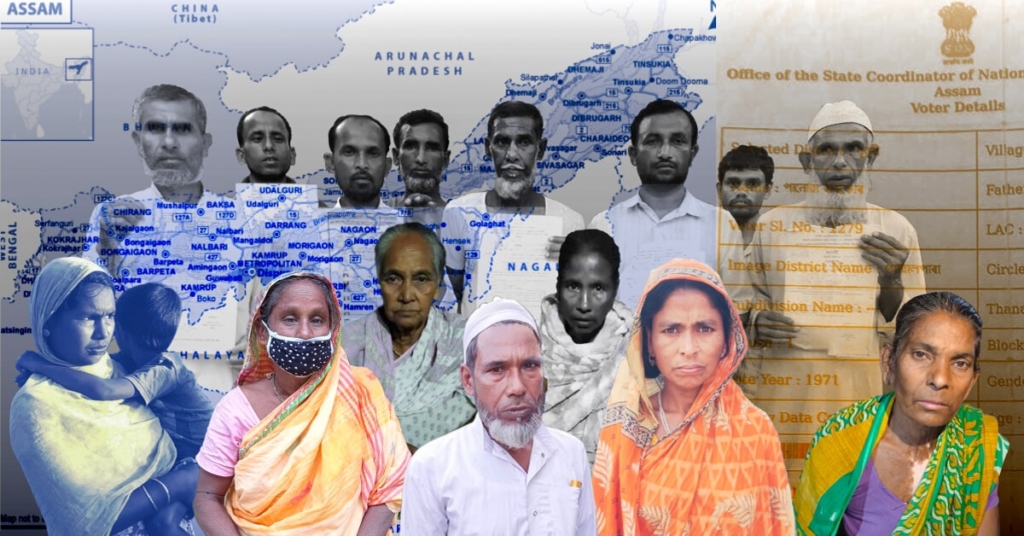
CJP’s humanitarian work in Assam: Overcoming new challenges, achieving new milestones Here’s what our campaign to help our fellow Indians in Assam entails
14, Jul 2022 | CJP Team
CJP’s work related to helping Indian citizens in Assam has been one of our most significant human rights campaigns. Since its inception in 2017, the campaign has reached out to lakhs of Indian citizens.
During the period when the National Register of Citizens (NRC) was being updated in Assam, as many as 500 CJP volunteers, spread across 18 districts, had helped 12 lakh Indian citizens compile documents and file applications for inclusion of their names in the NRC. During that time, we had also set up a helpline number for citizens in distress. CJP had also helped people defend their citizenship during the Claims and Objections stage.
We had also conducted training programs and workshops to empower our volunteers to offer paralegal assistance to people during the citizenship crisis. Even today, they reach around 100 families each month, ascertaining new challenges, and helping overcome different crises such as people getting served D Voter or Suspected Foreigner notices from Foreigners’ Tribunals (FT), appeals against FT orders, etc.
Every day of each week, a formidable team of community volunteers, district volunteer motivators and lawyers—CJP’s Team Assam – is providing ready at hand paralegal guidance, counselling and actual legal aid to hundreds of individuals and families paralysed by the citizenship-driven humanitarian crisis in the state. Our boots on the ground approach has ensured that 12,00,000 persons filled their forms to enlist in the NRC (2017-2019) and over the past one year alone we have helped release 41 persons from Assam’s dreaded detention camps. Our intrepid team provides paralegal assistance to, on an average of 72-96 families each month. Our district-level, legal team works on 25 Foreigner Tribunal cases month on month. This ground level data ensures informed interventions by CJP in our Constitutional Courts, the Guwahati High Court and the Supreme Court. Such work is possible because of you, individuals all over India, who believe in this work. Our maxim, Equal Rights for All. #HelpCJPHelpAssam. Donate NOW!
Helping secure release of detainees from detention centres
We have also helped over 50 eligible inmates of detention camps get released on bail, many during the Covid-19 pandemic, in line with orders of the Supreme Court and the Gauhati High Court. This has been quite a challenging task.
Readers would recall that in May 2019, the Supreme Court had directed that those who have spent more than three years in captivity be set free on bail subject to certain conditions. These are as follows:
(a) Execution of bond with two sureties of Rs.1,00,000/- (Rupees one lakh only) each of Indian citizens;
(b) He or she specifies verifiable address of stay after release;
(c) Biometric of his/her iris (if possible) and all ten fingerprints and photos shall be captured and stored in a secured database before release from the detention centres. He or she shall report once every week to the Police Station specified by the Foreigners Tribunal;
(d) He or she shall notify any change of his or her address to the specified Police Station on the same day, and
(e) A quarterly report to be submitted by the Superintendent of Police (Border) to the Foreigners Tribunal regarding appearance of such released declared foreigner to concerned Police Station and in case of violation of condition, the DFN will be apprehended and produced before Foreigners Tribunal.
Almost a year later, in wake of the Covid-19 pandemic, the apex court then understanding the need to decongest prisons and detention centers, modified its own previous judgment and reduced the time served requirement to two years and surety amount to just Rs 5,000/-. A suo motu case order just after the Supreme Court Judgement finalised the total framework for release of the detenu.
It was this modification of the 2019 Order of the Supreme Court that made it more practical to ensure freedom from detention. The amount required as surety was more reasonable and the CJP team quickly began work. Observing strictly all restrictions required under Covid-19 pandemic guidelines for social distancing, these releases of extremely impoverished persons caused huge relief and emotional upheavals. Our team had to bear witness to the joys of ensuring human freedom only to be faced by the denial of dignity: many of those detained had been completely devastated economically by the process to secure their release before we stepped in!
Here are images of just some of the people we have been able to help so far:
Steps taken by CJP before, during and after an inmate’s release on bail
1) Identify eligible detainees
CJP volunteers have been in touch with authorities at various detention camps as well as lawyers and family members of detainees. We prepared a list of people who have completed the requisite period in detention in order to qualify for bail. Sometimes, when we helped one person secure bail, they would refer another detainee they had met in the detention camp and we would become aware of their case that way.
2) Find the correct address
There is often a discrepancy in the address as given by the detainee, the address as it appears in official records and the location from where the person was actually arrested. This often leads to confusion in terms of jurisdiction which creates further bureaucratic hurdles because bailors, or people who offer surety for bail, have to belong to the same revenue village as the detainee.
3) Find bailors
The next step is to find people willing to offer surety in order to bail out the detainee. Two bailors are required for each detainee. They not only have to belong to the same revenue village, but also must satisfy the following criteria:
- They must be citizens of India
- Their name must appear in the NRC
- They must have permanent land patta (land ownership document) in either their name or in the name of their family member whose name is also included in the NRC
- They must possess a Jamabandi document (proof of land ownership)
- They should have receipts of land tax payment
- They should have legacy data
- They should have certified copy of voters’ list with their name in it
- They should have valid voter identification card
Most people don’t have permanent land patta. 34 percent of people are landless. CJP has come across village after village where not one person has any land patta. CJP has found it challenging to find a person with permanent land patta and convince them to become a bailor for a poor, rootless person. Often, even when CJP was able to find people who met all of the above criteria and had all necessary documents, they would be unwilling to help bail out the detainee fearing either harassment due to bureaucratic hurdles or social boycott for helping someone perceived to be a ‘foreigner’.
When it came to tax clearance, we faced another challenge. Bailors need to provide up-to-date evidence of land tax clearance. Often, on account of being poor, many people have joint patta. CJP has had to clear up the pending land tax of many joint patta holders.
4) Get documents verified
The documents of all bailors need to be verified. Verification takes place at two places;
- the Mandal Department in the Circle Office at the Sub Divisional Commissioners Office (SDC)
- the Border Branch of the Assam Police
Often the officials at the SDC reject documents due to minor discrepancies. This is when CJP has to look for new bailors and start the process all over again. In some cases, the Border Police Inspector verifying documents, verifies if the bailor or their ancestor’s name appears in voters lists from 1966, 1971, 1997 and the latest voters list. In some cases, we have run back-and-forth for as long as 8 months!
5) Prepare all affidavits and petitions
After procuring all documents, bailors must go to an advocate to prepare separate affidavits for bailors and detenues. A Vakalatnama needs to be prepared along with the bail petition that needs to be submitted through the advocate. CJP team members work this out on behalf of the detenu’s family and bailors, as usually they have no capacity or willingness to pay the expenditure on behalf of the detenues.
6) Submit all documents and bail application at SP’s office
The verified documents and a bail application in a prescribed format are then submitted to the Superintendent of Police of the concerned jurisdiction. It is the SP’s signature that appears on the written release order which is made in triplicate; one copy for the SP Office, one copy for the concerned detention camp and one for the Ministry of Home Affairs (MHA).
7) Get the released inmate out of the detention camp
While earlier, it would be days before the inmate was released, the procedure has been expedited in wake of the Covid-19 outbreak. Now, most inmates are released within hours of the release order being issued. CJP ensures that each inmate is received outside the detention camp by a CJP team and they are dropped home safely in a vehicle arranged for this purpose. A CJP volunteer motivator or community volunteer always accompanies the newly released inmate home.
8) Post-release formalities
In the first week, the detainee and their bailors have to appear at the local police station to record their presence. The detainee has to also carry a picture of the person with whom they are living and submit it to the police. Subsequently, the detainee has to make weekly visits to the local police station to record their presence, but the presence of bailors is not required. If the detainee needs to step outside the jurisdiction of the local police station, they need prior police permission.
The entire CJP Team is committed to not just ensuring more such releases from detention, but also to providing legal aid and assistance for the victims to navigate a treacherous legal process. Though not ourselves directly, we are doing the best we can to ensure local support for the rehabilitation of the detainees released.
A complete list of people who have been released on bail from detention centres due to CJP’s interventions since the beginning of our programme, may be viewed here:
| Name | Detention Centre | Date of Release |
| Mojibor Rahman | Goalpara | Nov 19, 2019 |
| Samsul Hoque | Goalpara | Feb 28, 2020 |
| Abdur Rashid | Goalpara | Feb 28, 2020 |
| Kamal Ali | Tezpur | March 18, 2020 |
| Jainuddin | Tezpur | March 18, 2020 |
| Hajera Bibi | Kokrajhar | March 18, 2020 |
| Rabindra Mallik | Goalpara | April 19, 2020 |
| Abdul Salam | Goalpara | April 19, 2020 |
| Gul Muhammad | Tezpur | April 19, 2020 |
| Parbati Das | Kokrajhar | April 22, 2020 |
| Astami Das | Kokrajhar | April 22, 2020 |
| Bangshidhar Rajbonshi | Goalpara | April 22, 2020 |
| Khitish Singha | Goalpara | April 22, 2020 |
| Kiswar Barman | Goalpara | April 22, 2020 |
| Shanti Bala Ray | Kokrajhar | April 22, 2020 |
| Hellal Ali | Goalpara | April 22, 2020 |
| Gour Mondal | Goalpara | April 22, 2020 |
| Chittaranjan Ghosh | Goalpara | April 22, 2020 |
| Jubeda Khatun | Jorhat | April 29, 2020 |
| Saleha Khatun | Tezpur | May 3, 2020 |
| Sadhana Sarker | Kokrajhar | May 11, 2020 |
| Sunil Biswas | Goalpara | May 11, 2020 |
| Manoranjan Sarker | Goalpara | May 11, 2020 |
| Harimohan Barman | Goalpara | May 13, 2020 |
| Purnima Biswas | Kokrajhar | May 13, 2020 |
| Abdul Khalek | Goalpara | May 13, 2020 |
| Lalit Thakur | Goalpara | May 15, 2020 |
| Banesa Khatun | Tezpur | May 29, 2020 |
| Banamali Das | Tezpur | May 29, 2020 |
| Binod Das | Tezpur | May 29, 2020 |
| Rajendro Das | Tezpur | May 29, 2020 |
| Rahman Ali | Goalpara | June 2, 2020 |
| Harbala Khatun | Kokrajhar | June 23, 2020 |
| Jabed Ali | Kokrajhar | July 22, 2021 |
| Banesa Bibi | Kokrajhar | Feb 4, 2021 |
| Abdul Sheikh | Goalpara | April 30, 2021 |
| Gopal Mandal | Goalpara | April 30, 2021 |
| Amala Das | Kokrajhar | May 13, 2021 |
| Joykrishna Paul | Goalpara | May 17, 2021 |
| Adhir Chandra Sarkar | Goalpara | May 17, 2021 |
| Doyjan Bibi | Kokrajhar | May 28, 2021 |
| Shanti Basfore | Kokrajhar | June 4, 2021 |
| Fazar Ali | Goalpara | Aug 9, 2021 |
| Sona Khatun | Kokrajhar | Aug 19, 2021 |
| Dipak Deb | Goalpara | Aug 25, 2021 |
| Mrinal Mandal | Goalpara | Aug 25, 2021 |
| Gangadhar Pramanik | Goalpara | Sept 14, 2021 |
| Mojibor Sheikh | Goalpara | Nov 15, 2021 |
| Mahiruddin | Tezpur | Dec 08, 2021 |
| Mainuddin | Tezpur | Dec 08, 2021 |
| Nasimuddin | Tezpur | Mar 24, 2022 |
Additionally, we helped Chenbhanu Begum get bail from the Gauhati High Court. She had been declared foreigner in an ex parte order by the Foreigners’ Tribunal-4, Mangaldoi in Darrang District of Assam in 2019. However, she had not been arrested. The court ordered her not to leave the jurisdiction of the local police station without prior intimation and also directed the Border Police to record her finger prints and biometrics, if so advised and the petitioner has been ordered not to leave the jurisdiction of Darrang district without prior intimation to the police.
Cases in Foreigners’ Tribunals (FT)
Then there was the curious case of Moyna Barman, a Koch Rajbongshi woman in her 90s. When a confusion between her given name and nick-name led authorities to serve her a notice to appear before an FT, CJP stepped in to help her in June 2021. When the CJP team met her the first time, she had sworn, “I will not die until I clear my name and have this dark spot of being a ‘foreigner’ removed from my head!” Her persistence paid, and she finally got a judgment in her favour in February 2022. But as her health deteriorated – she can barely get out of bed now and survives only on biscuits – her anger at the whole unnecessary ordeal is still palpable.When the CJP team finally delivered her a judgment copy, she said, “What shall I do with this now? Do I have time for this now? Tell them to take it away and let me die in peace!” Read all about her ordeal here.
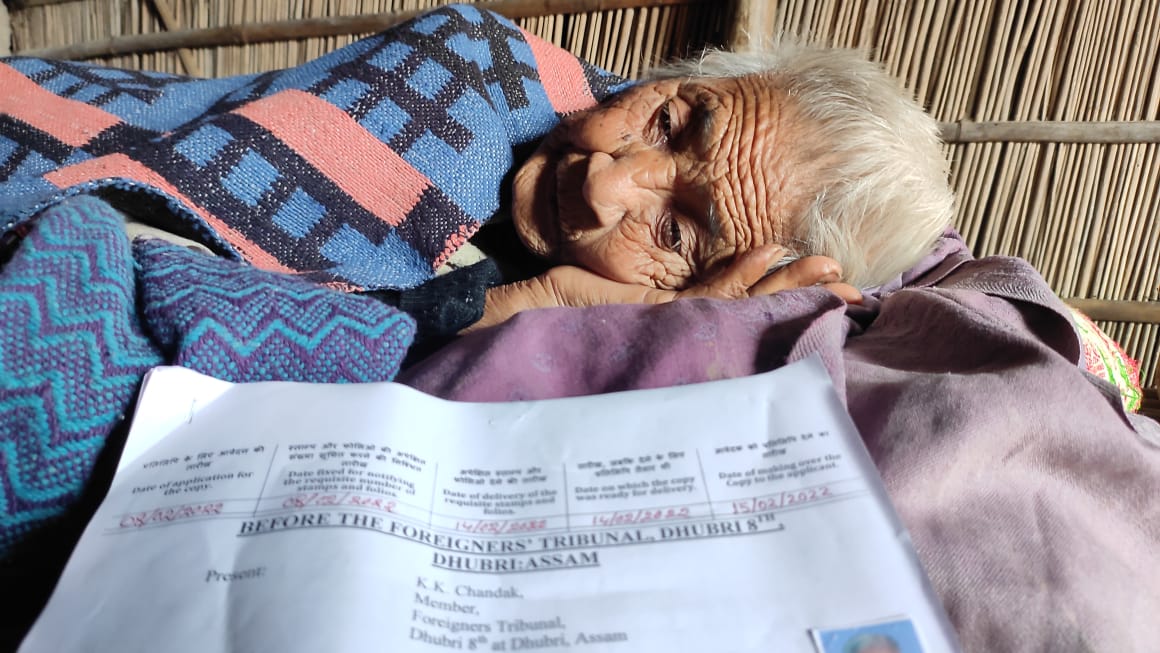
Another hapless woman forced to go through a completely unnecessary ordeal is 42-year-old Rupbhanu Bibi. She did not expect anyone of accusing her of being a foreigner in the land of her birth. But after being served a notice requiring her to prove her citizenship before a Foreigners’ Tribunal (FT) in Assam, she did not see any other alternative than to seek help from the Citizens for Justice and Peace (CJP) team in the state.
A perplexed Rupbhanu could not understand why such a fate befell her. She asked, “I have all the documents. I was born in this county. Even my father was born in this country… How I am Bangaldeshi?”
On February 2, CJP District Volunteer Motivators Zesmin Sultana and Rashminara Begum, who was once herself thrown behind bars, after being accused of being a foreigner despite hailing from a family of freedom fighters, met the family. We found that the border police suspected her of being a foreigner and had therefore served her a notice to appear before an FT.We immediately swung into action and started helping her prepare her documentation that needed to be submitted before the FT. She made her first appearance on February 11 and submitted her written statement and supporting documents on March 4 and CJP’s advocate Ashim Mubarak made arguments in her favour before the FT on March 5.
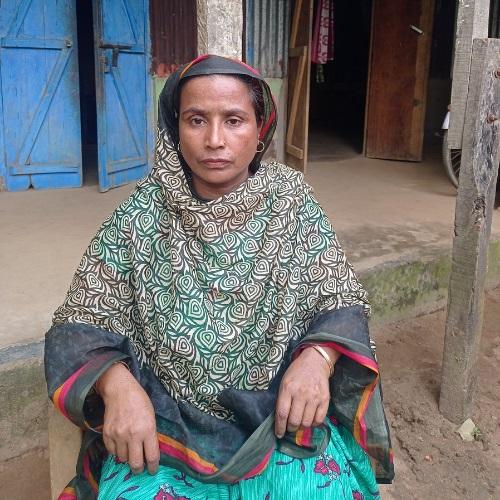
With our help, Rup Bhanu Bibi submitted in her written statement, and showcased with documents that her father Raham Ali’s name appeared in the voters’ lists in 1966, 1970, 1979, 1989 and 1997. Her own name appeared in the voters list of 2005 for the first time along with that of her husband in her marital village. She also submitted copies of her PAN Card as well as Gaon Panchayat Secretary’s certificate. Her mother and uncle testified in her favour. Gaon Panchayat Secretary also testified to the authenticity of the certificate of linkage.Thus, with CJP’s help the FT found Rupbhanu Bibi to be an Indian citizen by birth and thus declared her Indian on June 1, 2022.“When people are in trouble, Allah sends some people for help…I am happy and grateful today for the help received from CJP. It is because of your help, I was declared Indian,” said Rupbhanu after receiving the judgment copy. Read more here.
“In the last 15 days, our legal team has handled at least five cases on the tribunal level, and also paperwork is being completed to file at least three appeals before the Gauhati High Court,” informs Nanda Ghosh, CJP’s Assam state team in-charge.
Maintaining contact even after release
CJP’s work doesn’t end with just helping people get released on bail. CJP’s intrepid team of Community Volunteers and District Volunteer Motivators (DVM) have ensured that we have our ears to the ground and whenever one of the released detainees experiences any kind of distress, we find a way to address it.
One of the key problems faced by the released detainees, all of whom hail from really marginalised communities, is the legal requirement of reporting to the local police station each week incurring both a burden in terms of distances that this means and expenses that such visits entail. This is also why when we discovered that many of the detainees who hail from extremely impoverished families were struggling to find even a morsel of food during the Covid-19 pandemic, our team swung into action.
We delivered rations including foodgrains, cooking oil, basic spices and other essential commodities to detainees such as Shantibala Ray, Harbala Khatun, Harimohon Barman, Abdul Sheikh, Sahera Kahtun, Parbati Das, Joykrishna Paul, Banesa Bibi, Abdur Rashid, Shamsul Hoque, and many others. Read more here.
Readers would recall how in mid-June 2022, many parts of Assam were flooded due to the Brahmaputra overflowing its banks. Even the capital city of Guwahati had experienced water-logging in the aftermath of heavy rains, though the waters have now subsided.
Throughout this ordeal, CJP’s team remained active in flood hit areas like Kokrajhar, Goalpara, Chirang, Barpeta, Bongaigaon, Dhubri, South Salmara-Mankachar, Darrang, Morigaon and Nagaon. But all the while, our team was mindful of following all safety precautions.
“Sometimes entire villages get washed away during such heavy-rainfall. Many flood-affected families have entrusted their documents with the CJP team. Some were worried their documents would get either lost or damaged when they were forced to move to relief camps. We have stored all their documents safely and kept meticulous records,” say Papiya Das, who came on board as CJP office in-charge and translator after receiving paralegal training during one of CJP’s workshops.
Here are a few images of our outreach:
Going above and beyond the call of duty
This year, there were two instances where CJP pushed harder than ever to help our fellow Indians in Assam. The first pertained to locating the natal village and family of one Sona Khatun who was forced to spend over 5 years at the Korajhar detention centre because nobody came looking for her. A similar fate befell Gangadhar Pramanik, a migrant worker from West Bengal, who was shockingly declared “foreigner” in Assam! CJP’s Assam team went well above the call of duty to help these two people.
Sona Khatun had lost touch with her family after she married a man against their wishes and moved away from home. After her husband abandoned her, she took up work as domestic help in Guwahati from where she was arrested after being declared foreigner. Assam state team in-charge Nanda Ghosh, who had been leading the search, says, “We found out about her last year when we were helping other detainees get released amidst the Covid pandemic. But it was difficult to locate her family as she was arrested by the border police in Kamrup, but did not have any family there.”
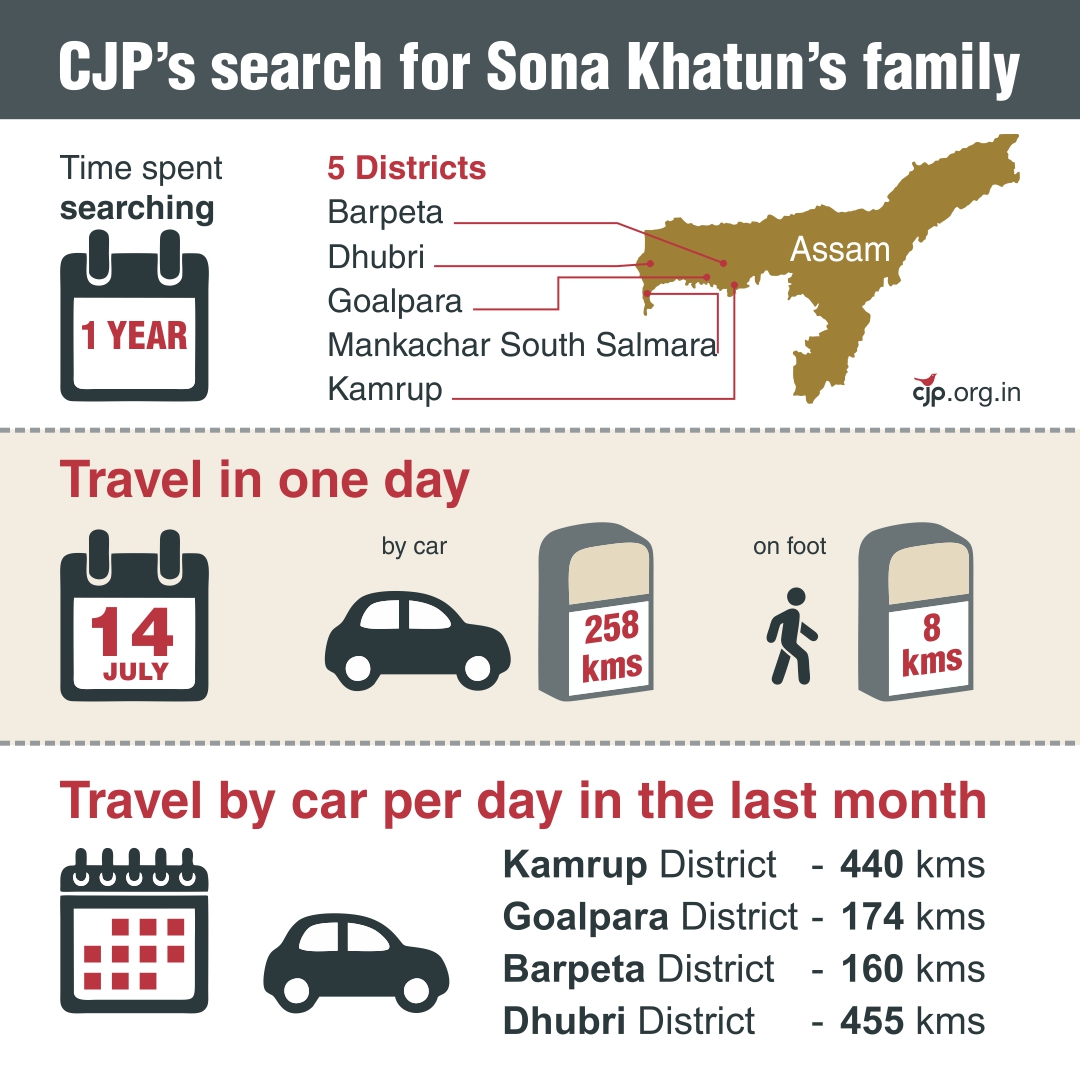
We then expanded our search radius, moving from one village to another, from one district to another. “Our search lasted almost a year and spanned five districts: Kamrup, Goalpara, Barpeta, Dhubri and Mankachar – South Salamra,” says Nanda Ghosh. After finding out about a local religious leader, we went to meet him in Harukhunda village that is located along the border with Dhubri district.
On July 14, Nanda Ghosh went there accompanied by District Volunteer Motivator HabibulBepari and driver-photographer Ashikul Ali. With his help and after walking for hours at end through inundated fields and forests full of thick foliage and poisonous insects, we finally found not only her family, but also a bailor. In our year-long search, we travelled over 800 kilometers. Read more about this incredible search for Sona Khatun’s family here. Eventually we were able to not only find teh family, but also get Sona Khatun released and reunited with them. Here are a few images:
The second was the mammoth task undertaken to reunite Gangadhar Pramanik with his family in Bankura district of West Bengal. Pramanik was tired of watching his family deal with soul-crushing poverty and decided to go to Assam in search of work nearly a decade ago. But here destiny had other plans for him. After a series of unfortunate circumstances, losing a job and suffering a head injury when a drunken colleague attacked him, the simple man from West Bengal ended up being declared foreigner, even though he had only crossed state boundaries within his own country!
“We found out about him in July 2021, but we faced a unique challenge as he has no family in Assam. When we found his address in West Bengal, we discovered that nobody lived there anymore. Moreover, there was no way to contact them as they had left behind no forwarding address or phone numbers,” says CJP Assam state team in-charge Nanda Ghosh. But we did not give up and contacted his former neighbours to gather as much information as we could. Eventually we were able to establish contact with his sister and that’s when we learned of the devastating news. Gangadhar’s father Mantu had passed away and his mother had suffered a paralytic stroke. “Turns out both tragedies were the result of one thing – they were unable to contact their son who had left to work in Assam. They presumed that he was either lost, or worse… dead,” says Ghosh. But the bigger tragedy was that Gangadhar was unaware of his father’s passing and only came to know about it from us. “Nobody had been able to contact him after he was taken to the Detention Centre and we had to break the news of his father’s death to Gangadhar. He was at a loss of words and just cried,” says Ghosh.
This experience truly shook everyone in the CJP team, but team CJP persevered and after several hiccups, we were finally able to negotiate a complex arrangement. Since Pramanik did not have an address in Assam, CJP team incharge Nanda Ghosh and Advocate Abhijeet Chaudhury had to give written undertakings that they would take him home to West Bengal and take responsibility for him. They were also made to submit copies of their own documents such as voter IDs and passports. Additionally, the CJP team helped establish contact between police officials from both states via telephone, so that the entire process could be completed smoothly. “Now Pramanik will have to go and sign his attendance at the Radhanagar outpost of the Bishnupur Police Station every week. The officials from West Bengal Police will then send a copy of this via email to the Assam Border Police,” says Ghosh explaining the complex arrangement.
But we didn’t stop at just getting him released. Nanda Ghosh and Advocate Abhijeet Chaudhury, actually accompanied Pramanik all the way to his home in West Bengal, where he had an emotional reunion with his family. Read all about it here. Over the course of the next few weeks, the West Bengal government verified his documents and restored Gangadhar Pramanik’s Indian citizenship and included his name in the electoral roll. Here are a few images:
CJP’s Legal Aid petition before Gauhati High Court
In March 2021, we filed a petition before the Gauhati High Court seeking directions to the state to formulate effective and robust modalities for legal aid for people who have been excluded from the final National Register of Citizens (NRC) published in August 2019. These people will now be required to defend their citizenship before Foreigners’ Tribunals (FT) and since a large section of them hail from economically backward and marginalized communities, they would have no option but to rely on free legal aid provided by state and district legal aid authorities.
This PIL includes an extensive survey conducted by our team of several districts and over three dozen FTs that reveal a complete absence of infrastructure within. From legal rooms for lawyers to washroom facilities for female proceedees, the absence of basic amenities makes it a nightmare for persons compelled to go to FTs. Then, in response to this petition, the Gauhati High Court asked the Centre and the state of Assam to indicate their stand on provision of funds.
In February 2022, the Assam State Legal Services Authority (ASLSA) indicated in its affidavit that it is in need of financial resources to provide legal aid to the large chunk of the state’s population (over 19 lakh persons) who have been left out of the National Register of Citizens (NRC).The ASLSA has now filed an affidavit in this petition before the High Court stating that it has made endeavors to train its staff in citizenship matters however is lagging in financial resources for providing aid to the large population that has been left out of NRC. Read more here.
We had also conducted our own survey of personnel, infrastructure and other facilities at District Legal Services Authority (DSLA) offices in 10 Assam districts and discovered that not only were Assam DSLAs woefully understaffed, their staff was under-trained to handle FT cases. Read more here.
Memorandum against FT notices stuck on electricity poles
In April 2021, CJP’s Assam team discovered many notices by Foreigners’ Tribunals (FT) pasted on electricity poles in Bongaigaon in Assam. Our team discovered such notices in different parts of Bongaigaon city, including Babupara, Boubajar, Ghoshpara and North Bongaigaon. Most of the notices that were posted on various electricity posts were in the name of women. In some places, the writings on the notices were erased or became obscure and unreadable due to rain. We also found some notices without names and addresses were also pasted on electricity posts.
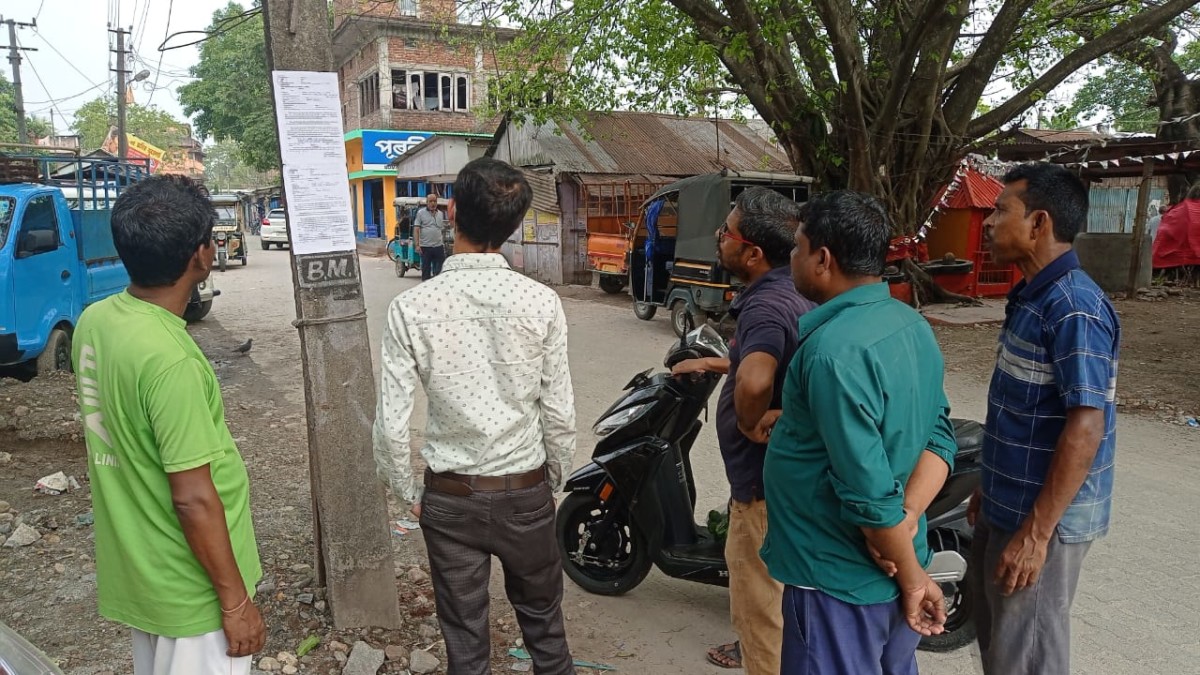
This is a clear violation of procedure laid down explicitly by the Foreigners (Tribunal) Order of 1964. Therefore, CJP approached the Deputy Commissioner (Bongaigaon), Principal Secretary to the Government of Assam and Superintendent of Police (Border) with a memorandum to take cognisance of such instances. In our memorandum, we brought to the attention of the authorities that pasting such notices out in the open, in public places is absolutely illegal.
CJP has urged the authorities to take necessary action against the serving body and set up an enquiry into this matter to find out how many such notices were served without following due procedure under the Foreigners (Tribunal) Order, 1964.
In addition to this, it has also urged that a “public declaration made that any notice served under the Foreigners (Tribunal) Order, 1964 without following due procedure laid down therein, shall not be considered valid and will not trigger the 120-day period for the proceedee to appear before the FT to prove his/her citizenship or for that matter any proceedings under the Foreigners Act, 1946.”
Read more here.
Related:
Floods and landslides cannot deter CJP’s Assam team
CJP’s intervention was God sent: Rupbhanu Bibi
CJP strengthens commitment to our fellow Indians in Assam in 2021
How CJP helped people walk out of Assam’s Detention Camps










